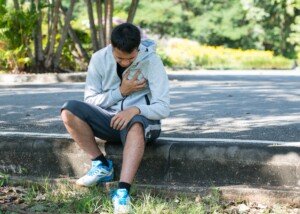
Exercise induced asthma (EIA) has several skilled mimickers. You should know what they are.
“The classic symptoms of asthma include wheezing and shortness of breath,” says Angel Coz, MD, FCCP, board certified pulmonologist, Associate Professor of Medicine, University of Kentucky, Lexington Veterans Affairs Medical Center.
“However, several other conditions may present with similar symptoms and mimic asthma.”
Asthma Mimickers
“Heart ischemia: condition caused by insufficient blood flow to the heart muscle,” says Dr. Coz.
“Although the main symptom is chest pain, it can present as shortness of breath.”
Another name for this condition is angina. It’s caused by clogged (blocked) coronary arteries.
“Gastroesophageal reflux disease (GERD): Patients typically experience heartburn from abnormal flow of stomach acid back into the esophagus.
“GERD can cause asthma or make asthma more difficult to control.
“Chronic obstructive lung [pulmonary] disease (COPD): disease most commonly caused by chronic cigarette smoking that presents with shortness of breath and wheezing.
“At times, it can be difficult to differentiate COPD from asthma. Patients with COPD tend to have chronic productive cough.
“Congestive heart failure: accumulation of fluid in the lungs caused by inadequate cardiac pumping of blood. It can cause shortness of breath and at times wheezing.
“However, heart failure typically presents with lower extremity swelling, inability to lay flat, etc.”
Coronary artery disease and untreated sleep apnea are major risk factors for congestive heart failure.
“Vocal cord dysfunction or paralysis.” This is one of those conditions that a primary care physician may easily overlook when the patient describes what happened to them out of the blue.
Vocal cords are muscles. Muscles are prone to go into spasm.
In VCD, the spasm locks the muscles into a closed or nearly-closed position, blocking the airway.
The result is a sensation that the windpipe is as narrow as a straw.
Inhaling, no matter how hard one tries, is difficult, and not enough air gets through.
A VCD episode may last seconds to a minute or so, and can occur in the fittest athletes.
When struggling to inhale, the person will typically hear a wheezing sound.






































